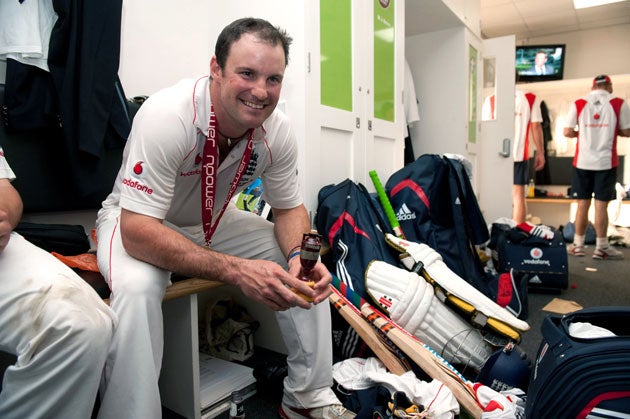Out of the Ashes, this England can rule the world
Lessons have been learned from 2005 and the right men are at the helm to take on all-comers

No parade to Trafalgar Square. No reception at No 10. No triumphalism. MBEs still not known but unlikely to be doled out willy nilly. Spot the difference: the Ashes 2009 compared to the Ashes 2005.
Four years ago, England made all the right noises about building on their grand victory against Australia but it came to nought. There were several factors – injury, illness, selection, a feeling of mission accomplished – but in effect the legacy was urinated up the wall of London watering holes on the evening and early morning of 12 September.
It will not be happening this time. The morning after the night before, Andy Flower, the team's coach, went for a run along the Thames and a couple of hours later, reflecting on the Ashes win, used the immortal phrase: "It's gone OK, but we don't want to go overboard."
There are differences between the two 2-1 victories. Then, England had been without the Ashes for 16 years, now it has been only four. Then, Australia were unquestionably the best side in the world with three, four, perhaps five of the greatest players in the game's history. Now they are not, and they haven't.
Then, the England team really were at the end of something because Michael Vaughan and Duncan Fletcher had carefully plotted a course over two years. There had
been six Test series victories in succession of which the Ashes was the culmination. Now, Flower and Andrew Strauss have completed only their second series together in official charge and the Ashes really is a stepping stone, albeit, Flower might have thought as he sang Oh What a Beautiful Morning on his dawn run, one as high as an elephant's eye.
England won the Ashes because they hung on in there, which is the most significant asset any team can possess. Only Strauss, as the series' leading run-scorer, performed well throughout. The next six in the runs list and the three leading wicket- takers were Australians.
It might have been different, it has been said, if the toss had gone the other way – England won four of the five tosses in the series. But it did them no good at Leeds and Australia no good in Birmingham. Forget the argument. England did not win at The Oval because they won the toss, they won because they took advantage of it.
Their reward for beating the world's No 1-ranked side is to play the world's No 1-ranked side. Australia have been toppled from their perch in the official rankings (and slipped bizarrely to fourth) and their place has been taken by South Africa, where England will tour this winter.
This will be an arduous assignment but then Australia managed to beat South Africa, who were seemingly rampant then, as recently as last March.
There could be the odd sight of England having four South African-born players in their top six, when the Test series begins in December at SuperSport Park in Centurion. Two of them, captain Strauss and wicketkeeper Matt Prior, came to England as boys, the others, Kevin Pietersen and Jonathan Trott, as young men who had learned their cricket in the land of their birth. Do not suppose that South Africans will stay quiet about this.
Nor does it reflect well on the English system of producing cricketers. The selectors may give themselves a pat on the back for summoning Trott to make his debut in that crucial match at The Oval – and his innings was a model of probity – but this is not the essence of international cricket unless it is what is meant by globalism. It, is however, a separate argument.
England have the makings of something here, having won from despair. The post-Flintoff era will bring challenges of balance and tone, it may also be the opportunity for restructuring elsewhere (Paul Collingwood and, despite his three late joyful wickets, Stephen Harmison). It is rapt with possibilities. Smashing.
Four steps to becoming No 1
1. Do not expect too much in South Africa. England will go to win, of course, but a drawn series could still represent real progress.
2. The side must evolve fairly quickly. It will miss Andrew Flintoff, no doubt, because after he was minted the mould was thrown away, but his departure might signal something. One eye must be on winning in Australia next year.
3. Decide soon whether it is to be four bowlers or five, and who bats at No 7 in either event (as well as No 3 and No 4) and crucially what happens at six if Matt Prior is injured.
4. If he got the job by default, there is no doubt this is now Andrew Strauss's team, but England must begin to plan for succession. South African vice-captaincy becomes important. Ian Bell (do not be fooled by Shermanator tag), Alastair Cook and Kevin Pietersen are all in the reckoning.
Stephen Brenkley
Subscribe to Independent Premium to bookmark this article
Want to bookmark your favourite articles and stories to read or reference later? Start your Independent Premium subscription today.

Join our commenting forum
Join thought-provoking conversations, follow other Independent readers and see their replies